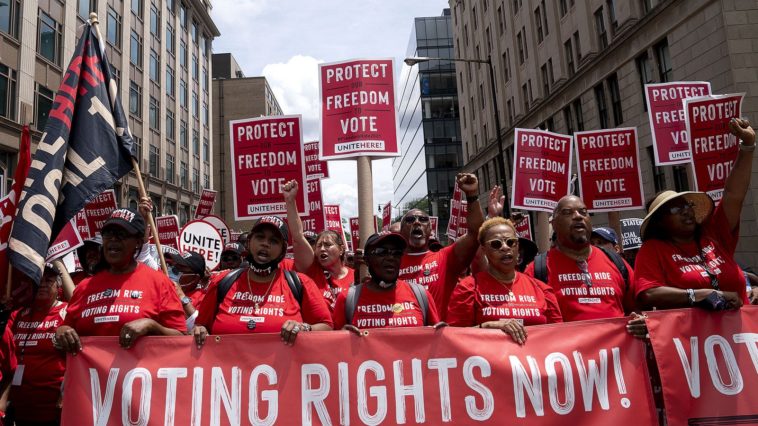In a bold quest to extend the democratic process, the New York City Council is seeking the support of New York’s supreme judicial institution to overturn two recent judgments. If successful, this could potentially pave the way for non-citizens to participate in local elections. The proposed legislation is considered contentious by some, as it could potentially enable up to 800,000 legal non-citizens who possess green cards to take part in the electoral process.
The stance of the City Council is a strong belief in inclusivity, stating that enabling non-citizens to vote could lead to a higher degree of civic involvement. This, in their view, will only fortify the City of New York by kindling increased political participation. Given the significance of this case, the council has recently appealed against a decision from the Second Department, asking for a reevaluation from the state’s utmost legal authority on the law’s harmony with the State Constitution, Election Law, and the Municipal Home Rule Law.
The progressive initiative has been threading its way through the court’s hands ever since it was adopted by the City Council in 2021. This daring legislation was signed into law by then-mayor Bill de Blasio, a Democrat. However, in a twist of legal events, an appeals court declared the law unconstitutional just last month.
Also solidifying the challenging legal terrain for this legislation, a decision from 2022 by a lower court has been upheld, which had initially deemed the law unconstitutional. This ruling was fought against by the incumbent mayor, Eric Adams, also a Democrat, and the City Council.
At the outset of 2022, Adams expressed his initial reservations about the potential implications of the bill. However, he stated that subsequent discussions with his colleagues allayed his concerns. The ruling from the appeals court last month shed light on how the ability to vote for non-citizens could potentially mean allowing them to run for mayoral offices.
Michael Tannousis, an Assemblyman from the Republican Party who represents Staten Island, was one of the individuals who challenged the law in court. Despite the seemingly democratic intentions, there are voices of concern and skepticism not all of which are unfounded.
Arguably, the Pandora’s box that this legislation could open up does not include illegal immigrants gaining voting rights. However, the skyrocketing arrivals of migrants remains a major hurdle that the city continues to stumble upon. Across spring of 2022, reports indicate an influx of more than 183,000 migrants into the heart of the city.
This overwhelming surge of migrants has been testing the limits of the city’s shelter infrastructure, leading to budgetary restrictions and adjustments. There is an understanding among some that addressing the needs of these newcomers involves walking a tightrope where resources must be balanced to ensure support for all residents, including taxpaying non-citizens.
Amidst these challenging circumstances, the City Council fervently defends the notion that legal non-citizens, such as green card holders, should have the right to voice their political choices since they are contributing through tax payments. They argue that their status as taxpayers gives them a stake in the political decision-making that affects their day-to-day lives.
The City Council believes that since these legal non-citizens contribute to the economy through taxes, they should be engaged in the democratic avenues of decision-making. After all, these decisions potentially affect these taxpayers directly and in significant ways.
However, there are those who hold different opinions on the legal boundaries of the council’s authority. Their argument is that the council has overstepped its jurisdiction in making such a decision. This perspective rests on the traditional understanding of the limitations and rights of civic bodies.
Despite the council’s declaration of the proposal’s consistency with state laws and the constitution, the opposition suggests a careful reading of established legal frameworks. Some perceive the legislative push as a drift from the traditional interpretation of the law.
While these debates continue to stir up discussions on the floors of institutional halls and courtrooms, the city at large waits on the ruling of New York’s highest court. It’s a test of the legal system and the city council’s understanding of their jurisdiction, authority, and the constitution.
This saga represents a significant moment in the city’s history, where the essence of democratic engagement is being put to the test. On the one hand, there is a call for inclusivity and extension of democratic participation to taxpaying legal non-citizens. On the other hand, some perceive it as a potential overreach of authority that may have unforeseeable consequences.
This unfolding legal drama reinforces the continually dynamic nature of democracy and governance. As arguments are made for and against the proposed law, they underline the checks and balances in place to ensure legal statutes best reflect the needs, rights, and responsibilities of the residents they govern.
As the city navigates these complexities, citizens, legal immigrants, and civic leaders keenly await a decision from the state’s highest court, marking a pivotal moment in New York’s legislative history. The impacts of which will not only reshape local governance but may also send a powerful message to municipalities far beyond the city’s borders.


